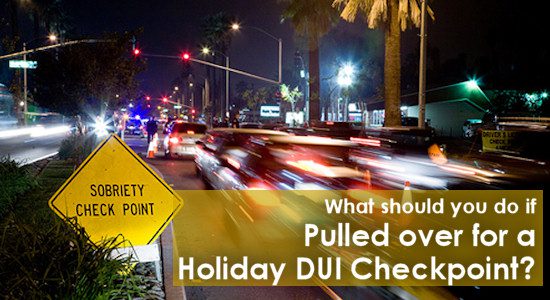What should you do if pulled over for a Holiday DUI Checkpoint?
Celebrating the end of the year during the holiday season is a tradition as old as the calendar. Whether you are a Christian who rejoices in the birth of the Savior or an agnostic who is just happy to have the year completed, everyone likes to celebrate the season. Another tradition is to have a few drinks to “loosen up” and enjoy the festivities. Drinking can be a great way to have a good time, but when it is combined with other activities such as driving, it creates danger both to the driver and other people. For this reason, drinking and driving is illegal in all 50 states and offenders are subject to severe penalties from the legal system, including fines and even imprisonment.

Because drunk driving presents such as danger to the community, many local police departments operate “sobriety” or “DUI” checkpoints on major roads. These checkpoints are routinely run throughout the year but are often more frequent during the holiday season. Sobriety checkpoints are typically run at night by a group of police officers that inspect each vehicle to determine if the operator is driving under the influence. Importantly, the police generally also look for other legal infractions (such as drug offenses) during these stops as well.
What should you do if you are stopped by a sobriety checkpoint? This article will discuss the five critical things you should do if you encounter a DUI checkpoint this holiday season.
Do Go Through the Checkpoint
Law enforcement agencies have very specific and detailed procedures for operating sobriety checkpoints, including setting them up so that they cannot be easily evaded. As in any other situation involving the police, attempting to avoid an encounter creates reasonable suspicion and will lead to an attempt to apprehend and closely inspect you and your vehicle.
Do Know Your Rights about Searches
Remember, the purpose of a sobriety checkpoint is to protect public safety by finding drunk drivers. It is not to give the police a reason to ask your permission to search your person or your vehicle. If the police see contraband in plain sight (such as weapons or drugs) they do not need your permission; but if not, do not consent.
Do Know Your Rights about Questioning
Americans have a constitutional right to privacy, which means that you do not have to answer police officer’s questions. Use that right: if the officer asks you if you’ve been drinking, politely tell the officer that you would like to speak with your lawyer before answering any questions. Always be polite!!
Do Know Your Rights about Breathalyzer Testing
You do not have to take the breathalyzer test. Although many states impose penalties (such as license suspensions) if you refuse the breathalyzer, such an outcome may be a good alternative to providing hard evidence of your intoxication level. More often than not, a lawyer will recommend you do the breathalyzer test and then ask to be released to have an independent test completed at a hospital. But it is strongly recommended that if you encounter a DUI checkpoint that you ask to speak with your lawyer – they will advise you of the proper action.
Do Know Your Rights about Legal Representation
If you are ensnared in the legal system from being stopped at a DUI checkpoint, the best thing you can do for yourself is to get legal representation. A qualified, experienced DUI attorney can provide invaluable counsel and advice that will help you achieve the best possible result in your case.
About the Author
David Michael Cantor is a Tempe DUI Attorney who has over 20 years in defending DUI cases in Arizona. The Law Offices of David Michael Cantor is an AV rated law firm serving the Phoenix-metro area.

